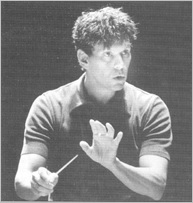
What led you into conducting film music?
I had been in Hollywood composing scores myself, including several non-union scores with the Seattle Symphony. This was my opportunity to conduct a true symphony orchestra and I began to discover that I had some talent in this area. I spent the first half of the nineties really learning how to conduct. At the very beginning of that time I just happened to fall into working with Elliot because John Corligliano suggested me when their regular conductor couldn’t do it. So I went out to California and was thrown into this cauldron of technical complication on “Alien 3”. It was really the first big film for all of us; Elliot had done some smaller films, so we all learned it together. Some of the films I’ve scored are “Pure Luck”, “Omen IV”, and additional music for “Darkman”, as well as things for public television and “HBO”. I also conducted “Batman Returns” for Danny Elfman, but now I’ve gone back to my classical roots and I’m not really working in film nearly as much as I was five or six years ago. Although I will continue to conduct for Elliot and other friends who I really want to work with.
You’ve been conducting with Elliot since “Alien 3”. Why did you continue working with him?
I continue to work with Elliot because the music is interesting. It keeps me interested as a conductor, and it keeps the players interested as players. That’s what really keeps me coming back. Also, Elliot works with the best directors in the world and that’s what makes the recording process more interesting. It’s always a challenge; very interesting, very detail-oriented, and very much written for the orchestra. The players find it fairly natural because it’s well-orchestrated; it’s orchestral techniques by and large they have seen before. Occasionally there’s a particular sound or aleatoric gesture that they haven’t seen and they have to ask, ‘How do I play this?’ More often than not, on the first reading they can essentially deliver the music as it was meant to sound.
Which of Elliot’s scores were a highlight for you?
For me personally, “Alien 3”. Also, other highlights for me were in “Interview with the Vampire”. This was a very evocative and interesting score. There have been so many. We did a score in London called “Voices from a Locked Room. This was such a marvelous score of Elliot interpolating the music by Peter Warlock – arranging in some cases, as well as writing some of his own. It was all done with a chamber orchestra. The movie never opened, but for me it was one of the most pleasant experiences I ever had working on a film. I think we all felt that something very wonderful and extraordinary was happening musically here.
What is unique about Elliot?
Elliot came to film music long after he had an extensive classical and new music education. He was completely at home and very comfortable with the most advanced gestures in classical music. He really was a composer working in those areas, so for him to turn his attention to movies – he’s a much more interesting thinker than most film composers. He also had a very big background in theater, and his incidental music that he wrote with Julie is very interesting. In that sense, he’s kind of like Bernard Herrmann; he followed the same kind of path as Bernard Herrmann did working in radio. He’s also written ballet and concert works, so I think it all makes a very interesting package.
Do you enjoy conducting Elliot’s scores?
I do, although whenever there’s a click track it doesn’t really require a conductor. It’s really for rehearsing and then communicating to the players how to do what the composer wants; but once the click track begins it’s really irrelevant. I find it’s interesting to be in the middle there, to watch the picture, listen to the music, and occasionally I’m able to make some suggestions, but I enjoy it with Elliot because his musical ideas are unique and very interesting.
What have you learned from Elliot when working for him?
I just learned the kind of detail that really is required to make interesting film music, and he’s capable of that. Danny Elfman brought the same kind of attention to detail to his scores, but Elliot’s the first person I’ve seen since then that really listens to the last little detail of every single cue.